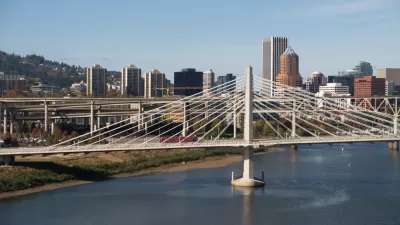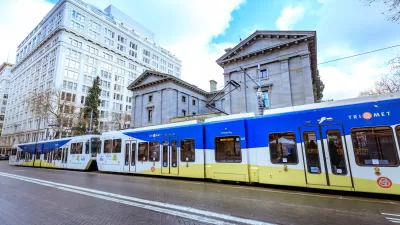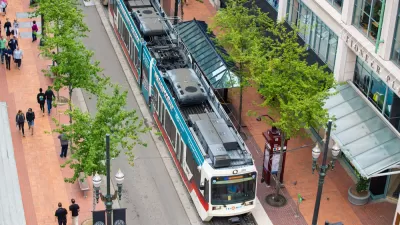Kaid Benfield looks at shortcomings of the dominant national apparatus for regional planning - the Metropolitan Planning Organization - through the lens of transportation, and pines for new mechanisms for regional cooperation.
The opportunities and challenges of contemporary planning and development, from transportation to economic development to climate change, do not stop at municipal borders. However, planning often does. As such, according to Benfield, "Our highly fragmented "system" of local governments makes it nearly impossible to address important issues facing metropolitan America in a rational way."
Using case studies of failed transportation integration in Philadelphia and Washington D.C., Benfield points to the shortcoming of MPOs in integrating cross-jurisdictional planning: "Especially when it comes to land use, MPOs are basically advisory, and their ability to influence what jurisdictions within their purview choose to do with regard to transportation, economic development, and other matters of great import tends to be extremely limited."
So what models for more effective regional cooperation are out there? Benfield looks to Portland's precedent-setting Metro, "the nation's only directly elected regional government with legal authority over regional land use, transportation, and other specified issues in three counties and 25 cities...But Metro's jurisdiction does not extend to those parts of the Portland region across the Columbia River in Washington, which lag behind their Oregon neighbors in addressing these issues."
He also looks to the SB 375, California's "innovative planning law to reduce pollution of greenhouse gases" as "the new frontier for regionalism in the US." The jury is out, however, on the extent to which the economic and regulatory incentives included in the law will be enough to empower the state's MPOs to exercise influence over regional land use and transportation patterns to a larger extent than prior models.
FULL STORY: Sustainability in the crazy-quilt world of metro regions

Alabama: Trump Terminates Settlements for Black Communities Harmed By Raw Sewage
Trump deemed the landmark civil rights agreement “illegal DEI and environmental justice policy.”

Study: Maui’s Plan to Convert Vacation Rentals to Long-Term Housing Could Cause Nearly $1 Billion Economic Loss
The plan would reduce visitor accommodation by 25% resulting in 1,900 jobs lost.

Planetizen Federal Action Tracker
A weekly monitor of how Trump’s orders and actions are impacting planners and planning in America.

Waymo Gets Permission to Map SF’s Market Street
If allowed to operate on the traffic-restricted street, Waymo’s autonomous taxis would have a leg up over ride-hailing competitors — and counter the city’s efforts to grow bike and pedestrian on the thoroughfare.

Parklet Symposium Highlights the Success of Shared Spaces
Parklets got a boost during the Covid-19 pandemic, when the concept was translated to outdoor dining programs that offered restaurants a lifeline during the shutdown.

Federal Homelessness Agency Places Entire Staff on Leave
The U.S. Interagency Council on Homelessness is the only federal agency dedicated to preventing and ending homelessness.
Urban Design for Planners 1: Software Tools
This six-course series explores essential urban design concepts using open source software and equips planners with the tools they need to participate fully in the urban design process.
Planning for Universal Design
Learn the tools for implementing Universal Design in planning regulations.
Caltrans
Smith Gee Studio
Institute for Housing and Urban Development Studies (IHS)
City of Grandview
Harvard GSD Executive Education
Toledo-Lucas County Plan Commissions
Salt Lake City
NYU Wagner Graduate School of Public Service





























